
Finding Joy in Simple Moments
In a world filled with hustle and bustle, it's essential to pause and appreciate the little joys that elevate our daily lives. For instance, attending a concert like Josh Turner’s not only offers a chance to enjoy fantastic music but also strengthens family bonds and creates lasting memories. Sharing these experiences with loved ones transforms an ordinary weekend into a cherished celebration.
Celebrating Milestones Together
As we recently celebrated our 18th anniversary, it prompted me to reflect on the importance of commemorating milestones, big or small. They bind us together, reminding us of our journey and the growth that accompanies each year. Whether through a special dinner or a grand adventure, taking the time to celebrate strengthens family ties and reinforces our commitment to each other. Perhaps next year, we’ll make it an adventure to Spain, who knows?
Incorporating Wellness in Everyday Life
Amid our celebrations, it's crucial to weave wellness into our routines, ensuring that mental and physical health remains a priority. Practicing mindfulness, engaging in outdoor recreation, and promoting healthy relationships contribute to our overall emotional wellbeing. Incorporating activities like yoga, meditation, or even family walks can significantly improve cognitive function and build resilience against stress.
The Impact of Healthy Habits on Family
Healthy living doesn’t stop with individual practices; it extends to our families too. As parents, setting a positive example with clean eating habits and regular exercise can inspire children to adopt similar behaviors. Simple actions like preparing nutritious meals together or participating in family fitness challenges create a culture of health and support within the household. This, in turn, fosters an environment open to discussions about mental health, addiction, and overall wellness.
The Importance of Reflection on Personal Growth
Sharing our experiences not only enhances connections with our kids but also encourages them to reflect on their journeys as they transition into adulthood. As they navigate challenges, discussing coping strategies and mindfulness techniques can empower them to manage stress effectively. Understanding the psychological aspects of addiction recovery and dual diagnosis treatment becomes vital for fostering a balanced environment that promotes open dialogue around mental struggles.
Future Aspirations and Growth
Looking ahead, it’s vital that we continue to set new wellness goals as a family. Perhaps trying out a new wellness program together or committing to a mindfulness app can introduce beneficial routines into our lifestyle. Exploring various wellness retreats or workshops can enhance our awareness of mental health resources, building a toolkit that shapes our family dynamics positively. These shared goals not only bring us closer but also establish essential life skills that can last a lifetime.
Join the Journey
As we navigate our journeys together, I invite you to share your experiences and what you’ve been up to lately. Whether celebrating milestones or embarking on wellness challenges, every story contributes to our understanding and growth. Join in the conversation and let’s inspire one another! As a special gift, if you subscribe to my newsletter, you’ll receive a free 30-day meal and fitness cheat sheet to kickstart your wellness journey.
 Add Row
Add Row  Add
Add 




Write A Comment